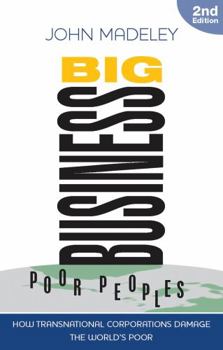Big Business, Poor Peoples: How Transnational Corporations Damage the World's Poor
Select Format
Select Condition 
Book Overview
Are transnational corporations (TNCs) the solution to poverty in the Third World or are they part of the problem? This is John Madeley's central concern in this exploration of large corporations. TNCs... This description may be from another edition of this product.
Format:Paperback
Language:English
ISBN:1848130333
ISBN13:9781848130333
Release Date:February 2009
Publisher:Zed Books
Length:256 Pages
Weight:0.75 lbs.
Dimensions:0.6" x 5.4" x 8.4"
Customer Reviews
2 ratings
a strong critique of globalization
Published by Thriftbooks.com User , 19 years ago
Madeley does an excellent job of covering the impact of transnational corporations (TNCs) on the poor of the world, particularly those of the third world. In doing so, he also discusses many of the ways TNCs also harm the environment, since the poor are often immediately dependent on the natural world in a way urbanized Westerners aren't. The picture is not pretty. In their pursuit of maximizing profits, TNCs pretty much consistently screw over the poor, disrupting traditional ways of life of indigenous people, small farmers, and small fisherfolk and making their already hard lives even worse. Even corporate charity is sometimes tainted--Madeley discusses the ways in which pharmaceutical companies, for instance, will give donations to countries of drugs that are nonessential and close to their expiration date--in many cases, they are simply donating extra stock they need to get rid of, not being truly generous (but they can still get a big tax write-off for doing so). Some of the ways in which TNCs harm the poor of the third world that Madeley discusses are well covered by other authors as well--the spread of subcontractors and sweatshop labor, and the destructive impact of agribusiness and genetically engineered seeds on small farmers. He also covers aspects of globalization that aren't so commonly discussed though--his discussion of the impact of tourism was really valuable. The book is not all gloom and doom though--Madeley does discuss successful campaigns to reign in abuses by TNCs. He actually seems fairly optimistic about our ability to address these problems. The principle weakness of the book is that it is mainly a description of the impact of the TNCs--there is not a lot of analysis of the why global capitalism works this way. And Madeley does seem to promise some such analysis in his opening chapter, particularly when he says he used to work for a TNC and so has some sense of how people in them think. You only get this analysis, however, in the last few pages of the book. It would have been stronger if it was presented at the beginning and interwoven with the rest of the book. Nonetheless, this book is invaluable for its documentation of the negative impact of corporate gloablization.
An indictment of unregulated global business behavior
Published by Thriftbooks.com User , 22 years ago
In "Big Business Poor Peoples", author John Mandeley convincingly documents how many transnational corporations (TNCs) have achieved their success by exploiting indigenous people and resources around the world. The book does much to put an end to the conventional argument that economic growth may be the best strategy to achieve an elevated standard of living among the poor. It also highlights the urgent need to impose tougher regulations on TNC business behavior. Mandeley argues that the characteristics of TNCs and the global economy that has emerged in the post-World War II era has enabled absentee owners to use enormous sums of finance capital and political power to take control of local resources to an extent never possible before. Because the poor have little voice in structuring or negotiating the deal, concerns for worker's wages, health and safety and care for the local environment usually takes a backseat to generating profits for foreign investors.Mandeley spends several chapters looking at the agribusiness sector. Agriculture remains the leading source of employment for most of the world's poor, but the book paints a grim picture of what the future may hold. TNCs are busily engaged in numerous activities -- such as purchasing arable land, patenting seeds and chemicals, introducing genetically engineered crops, and of course controlling commodity market prices -- that are making survival increasingly difficult for small farmers. In addition, government-sponsored exports of tobacco products are inculcating a deadly habit among tens of millions in the developing world. The resource extraction industries of fishing, forestry and mining are examined and shown to be particularly destructive to local communities. While overfishing deprives the poor of an important source of both protein and income, the usually permanent alteration to the landscape caused by unsutainable forestry and mining practices profoundly effects and disrupts local peoples.Other areas that Mandeley explores include manufacturing, energy, tourism, and health. In each instance, the author probes beyond corporate rhetoric to see what the real effects have been on the lives of the poor. A few examples: wage laborers who are paid little for manufacturing toys and clothing for Northern consumers are quickly discarded when their productivity begins to wane or demands for better wages are voiced; dams built to generate energy often cause extreme hardships by displacing people from their ancestral homes; tourism sometimes siphons water resources from local people to support hotel and restaurant operations; and vitamins and pharmaceuticals taken by uneducated consumers oftent create more health problems than they purport to solve. The book concludes with evidence of some small successes in controlling the behavior and accountability of TNCs, but Mandeley suggests that third world nations will probably need to demand fundamental changes in how their relationships are structured wit






